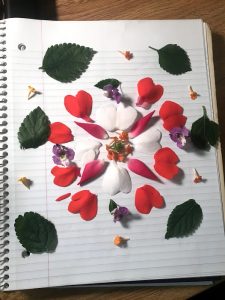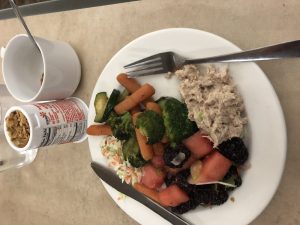I decided to take up mandala making as my personal project. I began to draw them often to practice the style of these repeating geometric patterns, however, I wanted to expand my project. I felt that simply drawing different looking mandalas or using different colors was not enough. Instead, I decided to make the mandala more physical and give the item more meaning. Seeing as that Lafayette College is my new home and the biggest change in my life so far, all the items I used in my mandala come from campus. Due to their abundance and the wide variety of shapes and colors, I chose to use flower leaves, stems, and pedals as the matter for my mandala.
What I find notable about this “flower mandala” I created is the diversity within the greater shape. By this, I mean that every item came from a different type of plant. The colors range from white to red to yellow and the textures of some leaves are rough while the pedals are like silk. Furthermore, some of the pedals are ripped or broken. They vary in size and some do not sit perfectly straight up. The beauty is that they can be this way. Its inconsistencies constitute its uniqueness and individuality.
The flower mandala is a reminder of Lafayette College itself and my experiences here. Further, the diversity in the mandala itself is what makes it entirely unique and personal.

Flower Mandala
